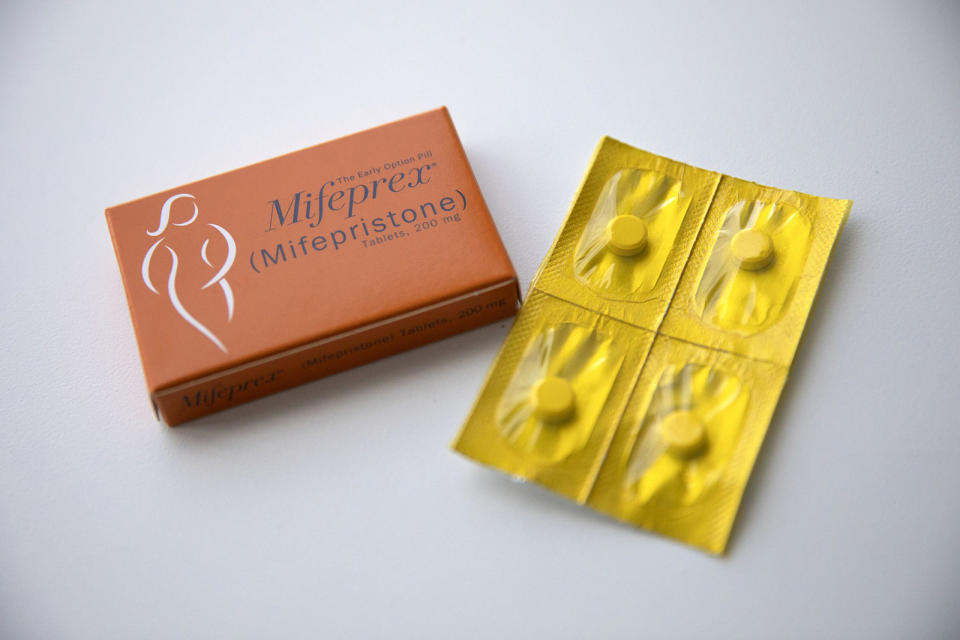Appeals court upholds some restrictions on abortion pill access, but drug will remain available for now
A federal appeals court Wednesday upheld parts of a decision limiting access to a widely used abortion pill, but the ruling will have no immediate impact on the availability of the drug, mifepristone.
In its ruling, a three-judge panel on the conservative-leaning 5th U.S. Circuit Court of Appeals held that the Food and Drug Administration failed to adequately take into account safety concerns when it loosened access to mifepristone in 2016.

While the ruling is a victory for abortion opponents, the Justice Department said it would appeal the decision. The Supreme Court this year issued a stay while the case goes through the appeals process, which has allowed the drug to remain widely available.
A spokesperson said the Justice Department “strongly disagrees" with the ruling and "will be seeking Supreme Court review of that decision.”
Vice President Kamala Harris said in a statement that the "decision stands between doctors and their patients."
"The Biden-Harris Administration will continue our efforts to protect access to abortion and defend the FDA in the courts. The President and I remain committed to protecting a woman’s right to make decisions about her own health care," Harris said.
The FDA-approved regimen for a medication abortion involves a combination of two drugs: mifepristone, which blocks the hormone progesterone, and misoprostol, which induces contractions. A majority of abortions in the U.S. are carried out using the pills, according to a survey conducted by the Guttmacher Institute, a research group that supports abortion rights.
The case originated in Texas, where U.S. District Judge Matthew Kacsmaryk ruled in favor of a group of doctors and medical professionals who oppose abortion and were challenging the FDA's approval of mifepristone, as well as later regulatory changes that made it more available.
One of the changes, in 2016, extended the window when mifepristone could be used to terminate pregnancies from seven weeks’ gestation to 10 weeks and reduced the number of in-person visits patients were required to make from three to one. Another, in 2019, approved a generic form of the drug, and another, in 2021, removed a requirement that mifepristone be dispensed only in clinics, medical offices and hospitals, thereby allowing it to be administered through telehealth and sent by mail.
Kacsmaryk, an appointee of former President Donald Trump, issued a ruling suspending the FDA's 2000 approval of mifepristone, citing in part what he said was “evidence indicating FDA faced significant political pressure” to approve the drug more than two decades ago.
The Justice Department filed an emergency appeal of Kacsmaryk’s order to the 5th Circuit, arguing that it “upended decades of reliance by blocking FDA’s approval of mifepristone and depriving patients of access to this safe and effective treatment, based on the court’s own misguided assessment of the drug’s safety.”
In it ruling Wednesday, the three-judge panel, comprised of two Trump appointees and one George W. Bush appointee, found that the groups and doctors who sued waited too long to challenge the original 2000 approval of mifepristone but that the post-2016 ways the FDA made the pill easier to get should be put on hold because the moves "were taken without sufficient consideration of the effects those changes would have on patients."
The judges vacated part of Kacsmaryk’s ruling that would have affected the generic version of the drug but left his order against the 2016 and 2021 changes in place.
The lawyer for the challengers, Erin Hawley of the Alliance Defending Freedom, told reporters that "we are very pleased with the Fifth Circuit’s decision" because it "restores the original 2000 safeguards to a dangerous chemical drug regimen."
"This is a significant victory for the doctors and the medical associations we represent and, more importantly, the health and safety of women," Hawley said. Asked whether she planned to appeal the part of the decision the challengers lost, she said, "We have not made that decision yet."
Evan Masingill, the CEO of GenBioPro, the manufacturer of generic mifepristone, said in a statement that despite the ruling, the drug "remains lawful and available on the market."
"We remain concerned about extremists and special interests using the courts in an attempt to undermine science and access to evidence-based medication, as well as attempts to undermine the US Food and Drug Administration’s regulatory authority," Masingill said.
Alexis McGill Johnson, the president of the Planned Parenthood Federation of America, said the ruling “makes it clear that mifepristone’s approval is very much still at risk, as is the FDA’s independence."
Katie Daniel, the state policy director of Susan B. Anthony Pro-Life America, a leading anti-abortion group, hailed the ruling.
“The FDA ignored science and its own rules when it rubber-stamped Democrats’ reckless mail-order abortion scheme," she said in a statement. "We won’t rest until the FDA and the profit-driven abortion industry are held accountable for the suffering they’ve inflicted on women and girls, as well as the deaths of countless unborn children.”
This article was originally published on NBCNews.com

